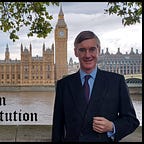The United Kingdom's sovereign authority is the King in Parliament. Until Tony Blair's ill-considered reforms, this included the executive, the legislature and the judges.
There was no separation of powers, and this was proved by the Lord Chancellor, who was a member of the Cabinet, voted in the House of Lords, and sat as a judge in the highest court, which was technically a committee of the House of Lords.
This system was viewed by the 18th century Whigs as the most perfect constitution, with internal balances and external strength. The power of the King, and hence the Executive, was balanced by the democratic arm, whose enthusiasms were controlled by the peers. The judges, while part of the political nation, were independent and could not be coerced.
This beautiful balance changed after 1832. The executive power of the monarch declined. In 1834 William IV was the last king to dismiss a government, when he removed Lord Melbourne to appoint a minority administration under Sir Robert Peel; the Duke of Wellington had declined the offer of the premiership.
As Victoria's reign developed, so the role of the head of state became more symbolic, in spite of Prince Albert's efforts. Thus, Bagehot could write in 1867 that the Queen had “the right to be consulted, the right to encourage, the right to warn”. This was not a degree of control that would have been recognisable to her grandfather, George III, let alone Queen Anne or Queen Elizabeth I.
The balance had shifted to the Commons, and was to move again after the second and subsequent Reform Bills, so that by the beginning of the 20th century the Commons was clearly the focus of power.
This was confirmed in legislation by the 1911 Parliament Act, and by King George V when he preferred Stanley Baldwin in the Commons to Lord Curzon in the Lords when selecting a Prime Minister in 1923.
This happened the year after the death of Albert Dicey, who had developed a theory of referendums as the only way to check the apparently untrammelled power of the Commons.
Dicey formalised the concept of parliamentary sovereignty, he invented the term and described his view of how the British constitution operated, but he feared the power of the Commons, as he foresaw a situation when the balance within the concept of the King in Parliament became a solitary power vested in the Commons.
This was not, however, what happened. Although the King and the Lords both lost power, it went via the Commons to Ministers, the civil service and the courts.
Perhaps the sheer volume of business meant that the Commons could not keep up, but secondary legislation led to power being devolved to Ministers and officials. Prior to the 1946 Statutory Instruments Act, there was some confusion about the procedure around secondary legislation.
Each Bill had its own mechanism, some using orders in council, or statutory rules issued by ministers. The Statutory Instruments Act had the advantage of clarity, but the accidental effect of neutering the House of Commons. Primary legislation is now often introduced which makes very few specific commitments, but relies on secondary legislation to fill in all the detail. These are known as skeleton bills, which effectively allow the government to make up the law with little further parliamentary scrutiny.
There are two means for introducing secondary legislation. One is the affirmative procedure, which requires parliamentary approval, but the instrument may not be amended, while the negative one allows laws to come into force unless Parliament objects, but it may only do so if the government makes time for a debate. The number of negative instruments that are objected to is minuscule.
The lack of scrutiny of secondary legislation has also increased the power of the courts. Whereas primary legislation is not questionable (its meaning is, but its validity is not), secondary instruments are subject to a validity test as well as a meaning test. In this way, both the administration and the judges have gained power, which the Commons has lost.
Unfortunately, this is, to a large degree, the fault of the Commons itself. This is a failing that has been made worse in recent decades, as attempts have been made to ‘modernise’ its procedures.
‘Modernisation’ is always code for making it easier for the government to have its way. It is designed to save time and remove obstacles. This has been true since the first closure motions, or cloture, as they were then called, in response to Charles Stewart Parnell in the 1880s. Time for scrutiny has been reduced, and MPs have morphed from national legislators into local champions.
In terms of time available for scrutiny by the whole House, in the 1950s, a Second Reading debate would, for a controversial Bill, be two days, the Report Stage one day and the Third Reading one day.
Today, almost no Second Readings last two days. I arranged for just one when I was Leader of the House, which was itself unusual. Report Stage is usually only one day, but even if it is longer, the time is limited, so the actual hours will be fewer than in the 1950s, when a guillotine motion was needed to conclude the debate.
Programming has been a convenient way of allowing MPs and ministers to go home, but has fundamentally reduced scrutiny on the floor of the House. Committee stages were unlimited in the 1950s but are now subject to programme motions.
At each stage there is less time for debate, but it is worse than the count of days indicates. In the 1950s, statements and urgent questions, then called private notice questions, were rare, and the time of ending a debate flexible. Now, there are many of both at the beginning of the Commons day, with a fixed hour for ending debate.
This means that some Second Reading debates or Report Stages can be crowded into two or three hours, with Third Reading debates often not taking place at all.
This sounds peculiar, but when the Report Stage and Third Reading are held on the same day, usually only an hour is allotted to the Third Reading. If there are votes on any of the amendments Members have put down at the Report Stage, the only time the whole House has the ability to debate a bill clause by clause, this eats into the time available to the Third Reading, and as each vote takes about a quarter of an hour, four or more divisions mean the time available for the final stage disappears.
Thus, legislation can be sent to the Lords with only cursory scrutiny in the Commons, and this is before noting that government MPs in the Committee Stage are routinely told by their whips not to say anything, as the aim is to pass the Bill as soon as possible.
The situation with Statutory Instrument (SI) committees is worse. Occasionally, SIs are brought to the floor of the House, but this is not generally because they are exceptionally controversial or need extra scrutiny, but simply because the government has no other agreed business. In other words, they are used as a space filler.
In committee, the aim is to leave the room as soon as possible. Again, government backbenchers are discouraged from speaking and the opposition rarely does more than go through the motions.
SIs are unamendable, so they must be either accepted or rejected. Even within government, they are not properly scrutinised. I remember one instance where a proposal to ban lorries from minor roads was in fact written to ban them from A roads and motorways. This was spotted just before it became law.
There is more scrutiny in the Lords, which does a much better job on SIs than the Commons, but the failure of Parliament as a whole to review them has inevitably led to judicial activity to see if they are valid, relate to the Act on which they are based and have been properly introduced.
Negative instruments receive no scrutiny, with very, very few exceptions, and are about 90% of the 3,500 instruments passed each year. So 350 have poor scrutiny in the Commons, leaving 3,150 unchecked by Parliament.
Such a vast number is part of the reason for the increased control by officials, for even a diligent Minister will not always be on top of the laws being churned out by his department. The knowledge balance is obvious, an official in charge of an individual SI will know exactly what it does, while a minister with hundreds passing across his desk cannot possibly have so much information.
In spite of all this, Ministers, and especially MPs, are still kept busy. A panoply of other activities have replaced the job of scrutinising legislation. General debates are held on days allocated to the backbench business committee or to opposition parties.
These may be more topical than legislation but are of no effect. When Theresa May lost her majority, the government stopped voting on opposition motions, as they have no binding effect. It was a way of absorbing parliamentary time without changing government policy.
This suits the government, because votes on legislation change the law, votes on general motions are merely decorative. This has become more extreme in recent years, with six of the last nine sessions showing a decline in the proportion of time allocated to legislative debates.
Troublingly, in 2022-3, 67% of government bills received fewer than five days of scrutiny in the Commons, up from 30% in 2007-8. I was Leader of the House for part of that session, and even when I tried to provide extra time, it was not wanted by the opposition.
Select committees were supposed to provide more accountability of the government, but are mainly ineffective. Governments have to respond to them, without needing to change policy. That is where legislation really matters, it affects the government of the nation.
The Commons began life as a chamber that, in return for taxation, sought redress of grievance, hence changes in the law. Now, MPs seem to want to use the Chamber merely for social media clips to boost themselves and their constituencies, leaving the Commons’ main role to the House of Lords, as it makes a much better fist of scrutinising bills.
Since our laws can once again be made domestically, as we have left the European Union, it must reclaim its legislative primacy and do its main job.
You can now earn rewards by referring friends. For instance, if you can encourage three friends to subscribe, you will receive a month’s paid subscription. For more details please see the Leaderboard page.
Your comments would be most welcome. Please click the button to join the conversation. Thank you.












